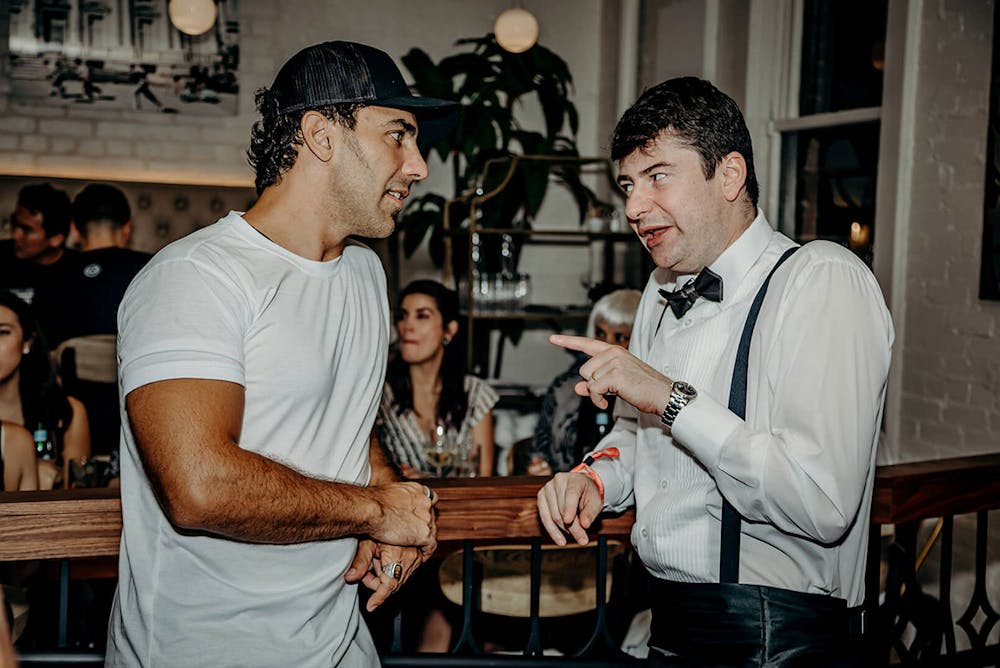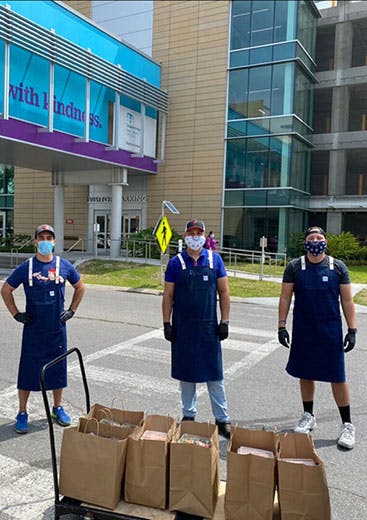PROFILES IN RESILIENCE: Billy Blatty, Dressed Hospitality Group, New Orleans, LA

This series highlights hospitality professionals who are responding to the industry crisis caused by the coronavirus pandemic in particularly creative, conscientious ways.
I was speaking recently with one of my favorite restaurateurs here in Denver, Juan Padro, about how his hospitality group, Culinary Creative, was juggling takeout and delivery service for multiple concepts with its participation in relief program Colorado Restaurant Response when the topic of a separate restaurant, Sofia, came up.
Opened in partnership with Culinary Creative in early 2019, Sofia is a spinoff of the group’s wildly popular Italian spot Bar Dough; both its chef and its GM—Talia Diele and Peter Gordon, respectively—hail from Colorado. But it’s not located in Denver. It’s in New Orleans, one of the epicenters of the pandemic. That gives Padro’s partner on the ground, Billy Blatty, a singular perspective on the industry crisis, so I asked him for his insights.
Ruth Tobias: For context at this surreal moment in time, could you tell us about yourself and your business?
Billy Blatty: I’m an entrepreneur/restaurateur. I’ve been in hospitality since 1995, starting in the bar business at the age of 18 and navigating my way through the industry, through all positions—service, management, nightclub promotion—[before] transitioning to the restaurant scene. Sofia is my third restaurant.
I’d been training for an expedition on Denali in Telluride, and when I drove back to Denver, I was snowed in and couldn’t leave. So I dined at Bar Dough and was really intrigued; I thought, “There’s nothing like this in New Orleans—I’ve gotta find some way to bring this to Louisiana.” Multiple trips turned into a friendship [with Padro and his partners].
Fast-forward to our stand-alone location. The menu is built upon [Culinary Creative culinary director Max MacKissock’s] model, but we wanted our own identity. I was thinking about how I wanted to brand it and asked myself, “What’s the most beautiful thing I know that’s Italian? Sistine Chapel, statue of David—oh, Sofia Loren! Everybody loves her: young or old, man or woman, hoity-toity or down to earth.” I think [her persona] kind of matches the style of food we’re going after and is a great way to design a restaurant. She was also friends with my family back in the late 1960s, 1970s; my dad used to be in the film business. The Enquirer even accused my mom of having an affair with [Loren’s husband] Carlo Ponti, which was not happening.
We got this really talented chef and GM from Denver. Peter had gone to Tulane and worked at Brennan’s and shucked oysters at Acme; he’s a rock star of an operator. His wife Talia’s Italian but had never had a chance to EC for an Italian restaurant. Now about 70% of the menu is hers.
RT: What’s the situation in New Orleans right now?
BB: I know the entire nation is struggling, but there’s no other way to say it—it’s brutal. We’re New Orleanians, so we’re used to disaster, whether it’s the BP spill or Katrina or floods. But this is unusual even for us. We’re very social creatures; we’re out all the time; we’ll take any excuse to be together. We have a festival every other day. If there’s a hurricane we throw a party. Even the way we eat is designed for togetherness—the crawfish boil binds our community together. And for so many reasons, people come to visit us.
New Orleanians have done an exemplary job of social distancing and not putting up a fight; I think we were pleasantly surprised because it’s not our nature. But then we’re all going, What comes next? We’re a city of 400,000 people, and the vast majority of our jobs are service-based. Hospitality and tourism are our driving force. To hear that not only will we not have festivals or conventions, we may not even have football games—it’s difficult to find adjectives to describe the feelings in my soul.
I’m confident that we’re going to get through this, but how we survive without any income from outside the city is the question. The name of the game is everyone’s trying to survive until 2021. This virus is insidious—people without any symptoms passing it on to one another. It’s a direct assault on our way of life, which is bonhomie, camaraderie.
RT: Given that scenario, how did you decide to keep Sofia open for takeout and delivery service, and what is it offering?
BB: We didn’t really miss a beat; we saw the writing on the wall, so when the civic order came down we were ready to transition to takeout and delivery. The big thing was what to do with our team. Management took half-salary, and unfortunately I had to give the hard news to everyone else. The next thing was, What’s gonna travel well? Our food isn’t really designed to travel, but we’re serving the things that will uphold their integrity [best]. Maybe we undercook the pasta a little because it’ll continue cooking itself in the container. For beverage, the civic order only allows us to do beer and wine. I don’t know why—maybe the city thinks people are gonna get tanked and not social distance like they should.
Our sales were really low to start with; our management staff was putting in 12-hour days to put out $2,000 in sales. It’s building every week, but it is difficult when the delivery services take so much out of your cut. D’Livery Nola bypasses delivery fees and puts people on bikes; we’re already live with that.
RT: In the meantime, you’ve started a program aimed at helping both your staff and your community. Tell us about that.
BB: The week the order came down, every company was laying everybody off en masse. So our first step was to do industry family meal—$4 for a half-pizza, salad, and a beer; $6 gets you a full pizza, salad, and beer. We wouldn’t make any money off it, but it would pay for our costs. But we also weren’t alone in doing it—there’s been phenomenal outreach in the hospitality business: Here’s where you go on Wednesday to get fed, here’s where you go Thursday.
So we were like, great. The industry has a place to eat. What else we can do for the community that matters, how do we get people to donate, and how do we give our employees hours? And the solution we came up with was Sofia Serves. The first responders are working thankless hours; they’re risking their lives and those of their families. Let’s feed them some great food and show them we care. And in addition, we can bring people in and give them billable hours. We’ve got two shifts: Sofia Serves shifts from 7 a.m. to 2 in the afternoon, and 2 p.m. to 9 p.m., which is our normal standing business. Peter is doing an amazing job with it. We were able to bring 25% more of our staff back, and people feel good about donating. It’s killing multiple birds with one stone.

RT: What does the short-term future look like for Sofia and your other businesses?
BB: Everything’s up in the air at the moment. A lot of businesses have decided to stop doing takeout, which has helped boost our numbers, but that’s a really sad thing to say.
I’m optimistic about Sofia, but I have a gastropub, Barcadia, that I’m very concerned about. It was the engine that made a lot of my other concepts possible: It’s 10,000 square feet, 70 employees, two blocks from the convention center, nine blocks from the Smoothie King Center, and a home base for post–Saints games. After a game we’ll do $140,000.
But the rent structure is high, and with the way things are right now, when are you gonna be allowed to have more than 50 people [gathered at once]? How do you survive with 35%–40% of the sales? You can’t bring back all of your employees. You’re not going to be servicing your entire space. You’re not going to be doing private events for conventioneers or bachelor parties. There will be no tourists.
Barcadia’s doing crawfish on the weekends, but it’s been kind of sad, bringing in $400–$700 per day. But I don’t think just laying down is acceptable, not if you can put tips in anyone’s hands or see someone’s face light up over a bag of crawfish and a beer for $6.
We did apply for [round two of] the PPP. The civic order still has us shut down through the end of May; if we can’t give our employees hours doing what we usually do, we’ll give them hours doing something else and get really creative with it. Like a carwash where we shuck oysters at the beginning [of the wash cycle] and by the time you’re done, there’s your tray and fixings—just one of a million off-the-wall ideas to keep our spirits up.
We’re blessed to have a landlord who’s working with us—if we didn’t we’d be up shit’s creek. From what I’ve heard, a lot of the lessors [in town] have been really understanding with the hospitality industry. New Orleanians realize that the only way to get through this is by looking at the bigger picture and helping each other. —Ruth Tobias
